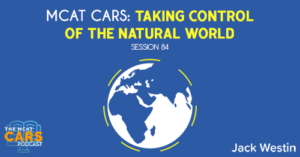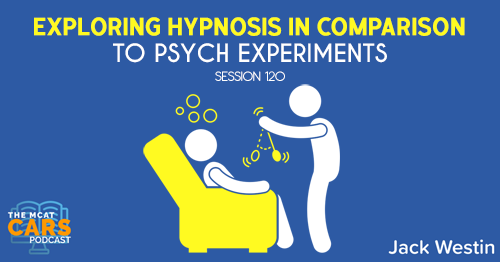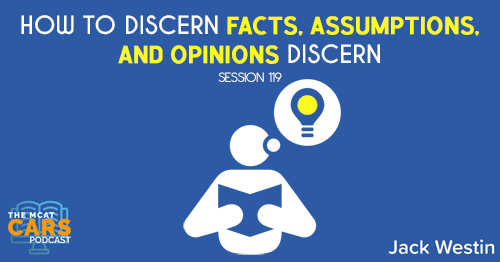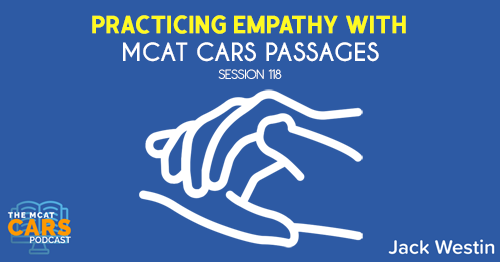Apple Podcasts | Google Podcasts

Session 84
Today we talk about finding common themes in sporadic passages as we look at this MCAT CARS passage that leaps from COVID-19 to zoos and beyond.
Get Jack Westin’s daily MCAT CARS practice right in your email inbox which has the same format as the actual test. Check out his free trial sessions to see if the course is right for you.
Listen to this podcast episode with the player above, or keep reading for the highlights and takeaway points.
Link to the article:
https://reallifemag.com/animals-strike-curious-poses/
Vying for eyeballs in lockdown, zoos around the world have been quick to market themselves as a solution to quarantine malaise, recasting animals as screensavers. On April 16th, the Bronx Zoo and the New York Aquarium both launched their own livestreams, while the San Antonio Zoo is now livestreaming yoga sessions with certified instructors. The program, called Zen Zoo, “lets you work on your flow while also enjoying a view of lions, bears, birds, and other creatures.” The Monterey Bay Aquarium in California offers MeditOceans, free, 10-minute mindfulness sessions inviting you to “ask yourself, what are the places in which you shut down emotionally?” while staring at “sea nettle serenity” or “moon jelly flow.” The global pandemic — with its death toll and mounting unemployment — can seem like a distant dream as we soften our gaze and let it follow the movement of transparent, floating mushroom caps, training ourselves to consume nature from a distance.
Two categories of livestreaming have emerged as marquee entertainment during the pandemic: 24/7 cameras placed inside cages, and daily programmed events such as feedings. The first category resembles a nature film in which humans are nowhere to be seen, therefore recreating the illusion of a natural habitat within a restricted environment (much like millions have been asked to do while “sheltering-in-place”). The latter category, on the other hand, emphasizes the interdependence of humans and animals. In an age of social distancing, watching a trainer being licked by an affectionate seal does more than reassure us that the animals are being cared for; while a mysterious pathogen threatens to kill us, it provides an antithesis to the idea that nature might do us harm.
These live webcams, operated by zoos and aquariums forced to close their gates, create the illusion of control over nature at a time when we feel entirely at its mercy. The outbreak of Covid-19 is partially explained by the increasing proximity between humans and wild animals caused by population growth and habitat loss. At the same time, human intervention has failed to stop the virus. Governments on every continent have fumbled public health efforts, and six months into the pandemic there is still much we don’t know about its spread or treatment.
Historically, zoos have always functioned as both a smokescreen and a mirror. First gaining popularity in Europe during the 1800s, they provided humans with a flattering reflection. As historian Hywel Williams poetically described, “Only a little below the angels stood humanity, divinely guaranteed its dominion over both Earth and its non-human inhabitants. It was a picture which was confirmed by the age of the discoveries — and those successes by gunpowder and colonial plot created a new cage for the old relationship between human and animal.” Bringing together the 19th-century obsession with taxonomy and its imperial ambitions, zoos domesticated animals as part of the European colonial project. They were a smokescreen, hiding the cruelty of colonialism and the disastrous environmental effects of industrialization and resource extraction by providing the growing middle-class with new leisure activities, presenting the yields of human plunder as something tame and delightful.
“The modern zoo,” writes Williams, “is post-colonial in its guilty strategies — in its free-range desire to keep the old show on the road but in the park.” To ease our conscience, zoos are now marketed as part of the conservation movement. Controlled, designed, and consumed by humans, these spaces are tasked with providing endangered species a safe sanctuary. Over a century after the invention of the zoo, the smokescreen now serves to hide the scale of extinction brought by human activity and resulting climate change. As ever, zoos serve to distract us or reassure us that nature and its habitants are intact, as long as they remain under our complete and full control.
[02:30] General CARS Test-Taking Tips
If you’re not comfortable with philosophy, art, or any random topics and you think that you’re not good at it, then you’re going to shut off and you’re not going to pay attention.
'You don't have to be the smartest person in the room. You just have to be very mature.'Click To TweetIt takes a level of maturity to realize that you don’t like something and so you have to prepare for it and practice. You have to be patient with yourself and figure out what you’re weak at and figure that out.
You can do well on anything you put your mind to. If you came this far, and you’re doing well on the sciences, you’re able to get a 127 or higher, then you’re capable of getting a 127 or higher on CARS.
It’s just a different animal. You just have to get used to it. However, a lot of times, many students do not want to get used to it. They don’t want to practice because they just don’t like it. So they’ll make up every excuse never to like and not study it. They don’t have the patience for it but anything else takes time. You need to adapt, progress, and practice.
[06:41] Paragraph 1, Sentence 1
Vying for eyeballs in lockdown, zoos around the world have been quick to market themselves as a solution to quarantine malaise, recasting animals as screensavers.
Jack says:
The author is talking about zoos and the vying for eyeballs. To students who ended up getting a 118 and when they start reading this, their mind isn’t really there. They don’t want to focus on this because they see the first words “vying for eyeballs.” They have no idea what that means or what it’s trying to convey. So it takes time to really learn, to read slowly, and to pay attention.
You can just break it down part by part, not even the whole sentence but just part by part. So if we just read this carefully, vying for eyeballs, that just means we’re competing for attention. Vying means competition. “Eyeballs” means people who see you. “In lockdown” may be confusing as you’re listening to this podcast and the lockdown is not happening all.
It’s easier to understand because you’re familiar with that term “lockdown.” But what if you weren’t right? This would be very confusing. So think about what a lockdown means you’re stuck in your home. So even if you weren’t necessarily aware of when this was written, you’re responsible for paying attention and figuring out this scenario.
“You have to be willing to embrace a new atmosphere, a new social kind of situation, or context that you may not be familiar with.”Click To TweetAn older passage is harder to read not because the concepts are harder, but because they use terms, terminologies, and keywords that you just may not be so familiar with. However, you can figure that out.
Basically, this sentence is talking about how a zoo can actually help solve our downtrodden times. “Screensavers” means that it’s on your computer. So you have animals on your computer and you’re watching them even if you’re not able to be there because you’re quarantined.
Now, if that’s hard for you to capture for the first sentence, you’re going to be very anxious. And instead of paying attention, you’re going to be deep in your own thoughts.
Bottom line is, stop pretending to read and read, and take your time. It’s a puzzle so do it one sentence at a time. You have to take it slow. You have to build that muscle in your legs for the marathon, so to speak. And eventually, you’ll get very good at reading. But it’s inexcusable to just give up on this.
[12:00] Paragraph 1, Sentence 2
On April 16th, the Bronx Zoo and the New York Aquarium both launched their own livestreams, while the San Antonio Zoo is now livestreaming yoga sessions with certified instructors.
Jack says:
This sentence cites examples of livestreams. But the first sentence is very important because if you’re not paying attention to that first one, you’re not going to be confident reading this second one. This is just like a puzzle. Keep going until it makes sense and until you can connect to what’s going on. But don’t guess.
[13:24] Paragraph 1, Sentence 3
The program, called Zen Zoo, “lets you work on your flow while also enjoying a view of lions, bears, birds, and other creatures.”
Jack says:
It’s just a further example of this San Antonio Zoo yoga. Zen is synonymous with meditation.
[13:51] Paragraph 1, Sentence 4
The Monterey Bay Aquarium in California offers MeditOceans, free, 10-minute mindfulness sessions inviting you to “ask yourself, what are the places in which you shut down emotionally?” while staring at “sea nettle serenity” or “moon jelly flow.”
Jack says:
It’s another example of a different aquarium or zoo doing something differently to vie for these eyeballs. Notice how fast you may be reading this. Because you invested your time early on, you’re going to finish this passage a lot faster without sacrificing comprehension.
[14:48] Paragraph 1, Sentence 5
The global pandemic — with its death toll and mounting unemployment — can seem like a distant dream as we soften our gaze and let it follow the movement of transparent, floating mushroom caps, training ourselves to consume nature from a distance.
Jack says:
The global pandemic is a bad thing. And it says it can seem like a distant dream because we’re focused on the zoo. We’re meditating, we’re doing nice things to relax. You can’t escape these bad things and escapable is essentially a distant dream. We are consuming the zoo in a different way given this new historical reality.
[17:18] Paragraph 2, Sentence 1
Two categories of livestreaming have emerged as marquee entertainment during the pandemic: 24/7 cameras placed inside cages, and daily programmed events such as feedings.
Jack says:
The author is explaining the different ways that zoos are doing these livestreams.
[18:05] Paragraph 2, Sentence 2
The first category resembles a nature film in which humans are nowhere to be seen, therefore recreating the illusion of a natural habitat within a restricted environment (much like millions have been asked to do while “sheltering-in-place”).
Jack says:
You don’t need human interaction and you’re just observing. You’re like being in a safari.
[18:35] Paragraph 2, Sentence 3
The latter category, on the other hand, emphasizes the interdependence of humans and animals.
Jack says:
The author is just explaining those differences again.
[18:46] Paragraph 2, Sentence 4
In an age of social distancing, watching a trainer being licked by an affectionate seal does more than reassure us that the animals are being cared for; while a mysterious pathogen threatens to kill us, it provides an antithesis to the idea that nature might do us harm.
Jack says:
While the Coronavirus is trying to kill us, it’s also saying nature isn’t all that bad. The animals are okay. But we also know that we’re going to be okay. We can still handle animals and not worry about viruses. So it’s just a brief explanation of the types of live streams and how the author views them. This is a concept that the MCAT could definitely test. It’s a figurative idea. They’re more likely to test on the impact the author thinks each one has.
[21:03] Paragraph 3, Sentence 1
These live webcams, operated by zoos and aquariums forced to close their gates, create the illusion of control over nature at a time when we feel entirely at its mercy.
Jack says:
The author is implying that we need a sense of control and that makes us kind of feel better.
[21:33] Paragraph 3, Sentence 2
The outbreak of Covid-19 is partially explained by the increasing proximity between humans and wild animals caused by population growth and habitat loss.
Jack says:
This is a little bit of a switch here to an explanation of COVID-19 and its cause.
[21:51] Paragraph 3, Sentence 3
At the same time, human intervention has failed to stop the virus.
Jack says:
It talks about how we can control nature initially and then now we can’t control it all the way.
[22:05] Paragraph 3, Sentence 4
Governments on every continent have fumbled public health efforts, and six months into the pandemic there is still much we don’t know about its spread or treatment.
Jack says:
It’s just more discussion about COVID-19 and what’s going on.
[22:37] Paragraph 4, Sentence 1
Historically, zoos have always functioned as both a smokescreen and a mirror.
Jack says:
This is the type of sentence that would confuse a non-native speaker and they would not understand what it means. But when you try to visualize smokescreen, that’s like blocking your view. You can’t see because there’s smoke in the way. Then a mirror resembles reflecting back. And what you see right in the mirror is yourself. You see yourself essentially if a reflection is so good. Obviously, if this is important, the AMCAS will emphasize that. If the MCAT really cares about something, they test it and you’re going to see it again.
[23:34] Paragraph 4, Sentence 2
First gaining popularity in Europe during the 1800s, they provided humans with a flattering reflection.
Jack says:
There’s that mirror kind of sentiment.
[23:57] Paragraph 4, Sentence 3
As historian Hywel Williams poetically described, “Only a little below the angels stood humanity, divinely guaranteed its dominion over both Earth and its non-human inhabitants.
Jack says:
There’s part of that reflection where we are above everything that’s non human. It’s an egocentric kind of reflection.
[24:23] Paragraph 4, Sentence 4
It was a picture which was confirmed by the age of the discoveries — and those successes by gunpowder and colonial plot created a new cage for the old relationship between human and animal.”
Jack says:
So the picture of angels and humans standing over animals. Humans are above the earth and the animals. And that picture was confirmed by the age of the discoveries. Basically when we discovered stuff, we confirmed that the picture was superior.
Then try to visualize gunpowder and colonial stuff. You’d imagine conquering these animals, as if it conquered other people and civilizations. It created a new cage or the old relationship between human and animal. So again, there’s this new cage because now we’re actually putting them in a cage.
Figuratively and literally, we are superior to them. And that’s just further emphasizing what we are superior to the animals.
[26:05] Paragraph 4, Sentence 5
Bringing together the 19th-century obsession with taxonomy and its imperial ambitions, zoos domesticated animals as part of the European colonial project.
Jack says:
It’s just a little bit more evidence of zoos and where they began. Domestication again, kind of means control. And that goes back to what we were talking about before. The zoo gives us some sense of control. So this reflection is very much tied to that.
[26:34] Paragraph 4, Sentence 6
They were a smokescreen, hiding the cruelty of colonialism and the disastrous environmental effects of industrialization and resource extraction by providing the growing middle-class with new leisure activities, presenting the yields of human plunder as something tame and delightful.
Jack says:
We were given the mirror kind of discussion earlier. Now, the smokescreen is coming back up. The author is stating that the smokescreens are hiding all of the bad stuff that humans are doing to the environment and to animals by saying here are cute little animals in cages so come watch.
The smoke screen blocks out the fact that we actually make animals under us by caging them. So we don’t have to face the reality of cruelty. And the fact that they are caged gives us this reflection that we’re superior to them. So that’s where the mirror and the smokescreen come in and that’s how you should understand it.
[27:42] Paragraph 5, Sentence 1
“The modern zoo,” writes Williams, “is post-colonial in its guilty strategies — in its free-range desire to keep the old show on the road but in the park.”
Jack says:
It’s saying you have the same situation even in the modern sense. It’s still an old show on the road but in the park so it’s a new setting, instead of really just being on the road. It’s now in a park but it’s still the same thing.
[28:40] Paragraph 5, Sentence 2
To ease our conscience, zoos are now marketed as part of the conservation movement.
Jack says:
When you go to the zoo, you make yourself feel better thinking you’re helping animals by locking them up.
[28:58] Paragraph 5, Sentence 3
Controlled, designed, and consumed by humans, these spaces are tasked with providing endangered species a safe sanctuary.
Jack says:
It probably is conservation, but it’s because of us that we’re conserving them. We’re essentially the downfall. We lead to the downfall of these animals to begin with. This is how the author’s painting us. It’s essentially suggesting that in some ways, we’re doing something bad. But we’re not aware of it and we don’t care about it because we think we’re superior and we try to hide it.
[29:51] Paragraph 5, Sentence 4
Over a century after the invention of the zoo, the smokescreen now serves to hide the scale of extinction brought by human activity and resulting climate change.
Jack says:
The zoos are hiding. We have all this death and destruction from our growth as a species on this planet and the zoos are just hiding all that by putting animals in cages.
[30:51] Paragraph 5, Sentence 5
As ever, zoos serve to distract us or reassure us that nature and its habitants are intact, as long as they remain under our complete and full control.
Jack says:
Again, it’s this narrative that we are the protectors and we will save everything. Just come into our cages.
[31:25] Main Idea
What the author wants you to realize is that whether the zoo is on the road, on a park, or on a webcam live streaming, the zoo gives us a sense of control. That seems to be the common theme here.
And it hides everything. That we are not aware of it. It cages the animals. It gives us a sense of control or a sense of superiority. We’re essentially above it. And the zoo adapts – given the shifts occurring through our history – no matter what. The zoo will adapt and still do these things for us. It gives us a sense of control.
You can say it’s as a smokescreen in that it hides the fact that we’re cruel to it. But discussing cruelty any further would be going beyond the passage.
The only reason the author brought that up was to further explain and support the fact that we want that sense of control. And that makes sense because the passage started off with the whole pandemic and how we’re scared and we’re not sure that’s why we watch the news. While we look at the zoo on our live cam. It’s just trying to rationalize the zoo in these different areas and what it does for us.
[33:36] Learning Points
You may not notice what the repeating theme is or what you think the main idea may be. But if you have a sense of what was said and how the author said it, you’re going to be able to capture enough to get the questions right.
“You don't have to understand every little sentence. But you need to figure out why the author is saying these things.”Click To TweetLinks:
Link to the article:
SEARCH SITE
SEARCH SITE
LISTEN FOR FREE











